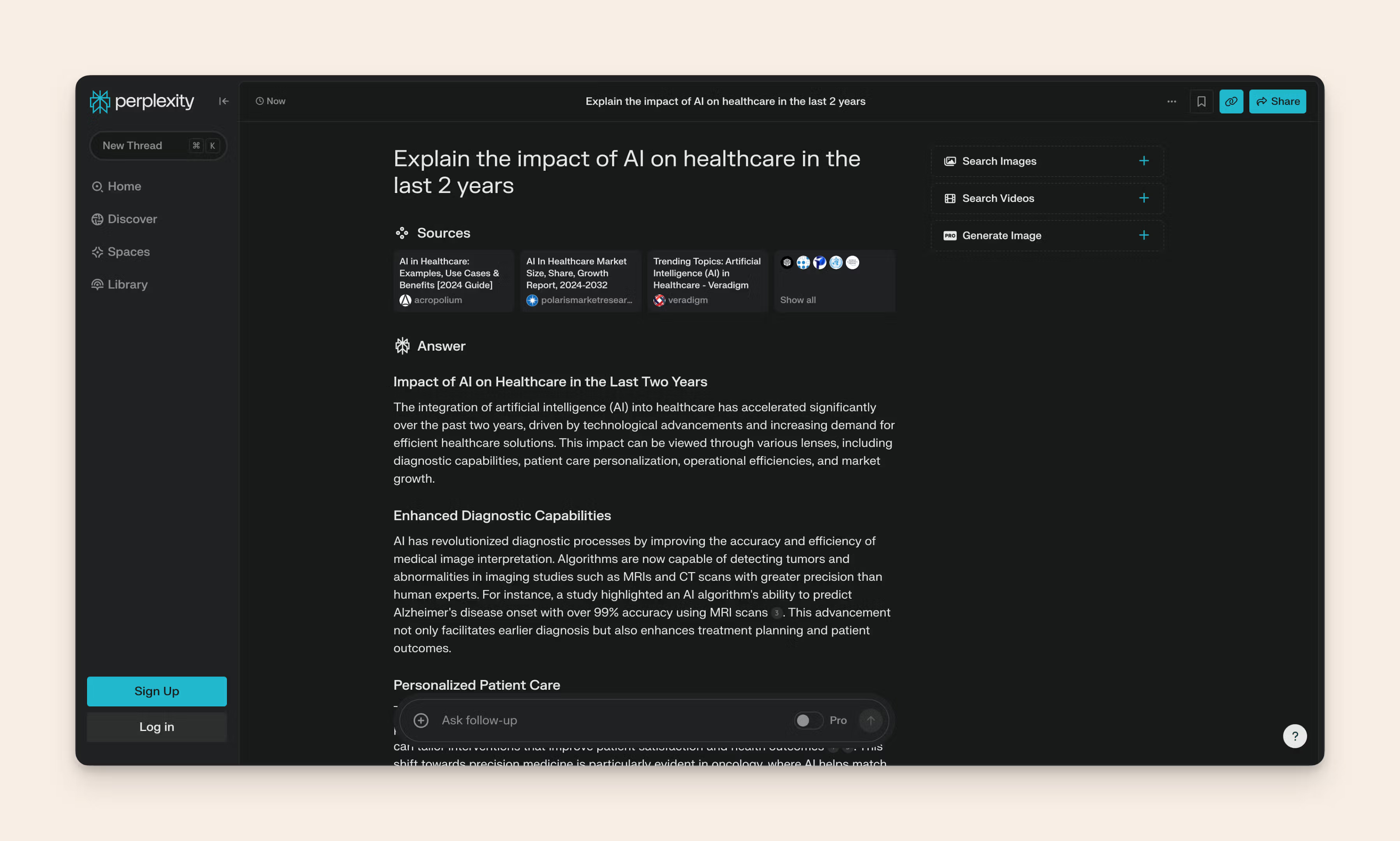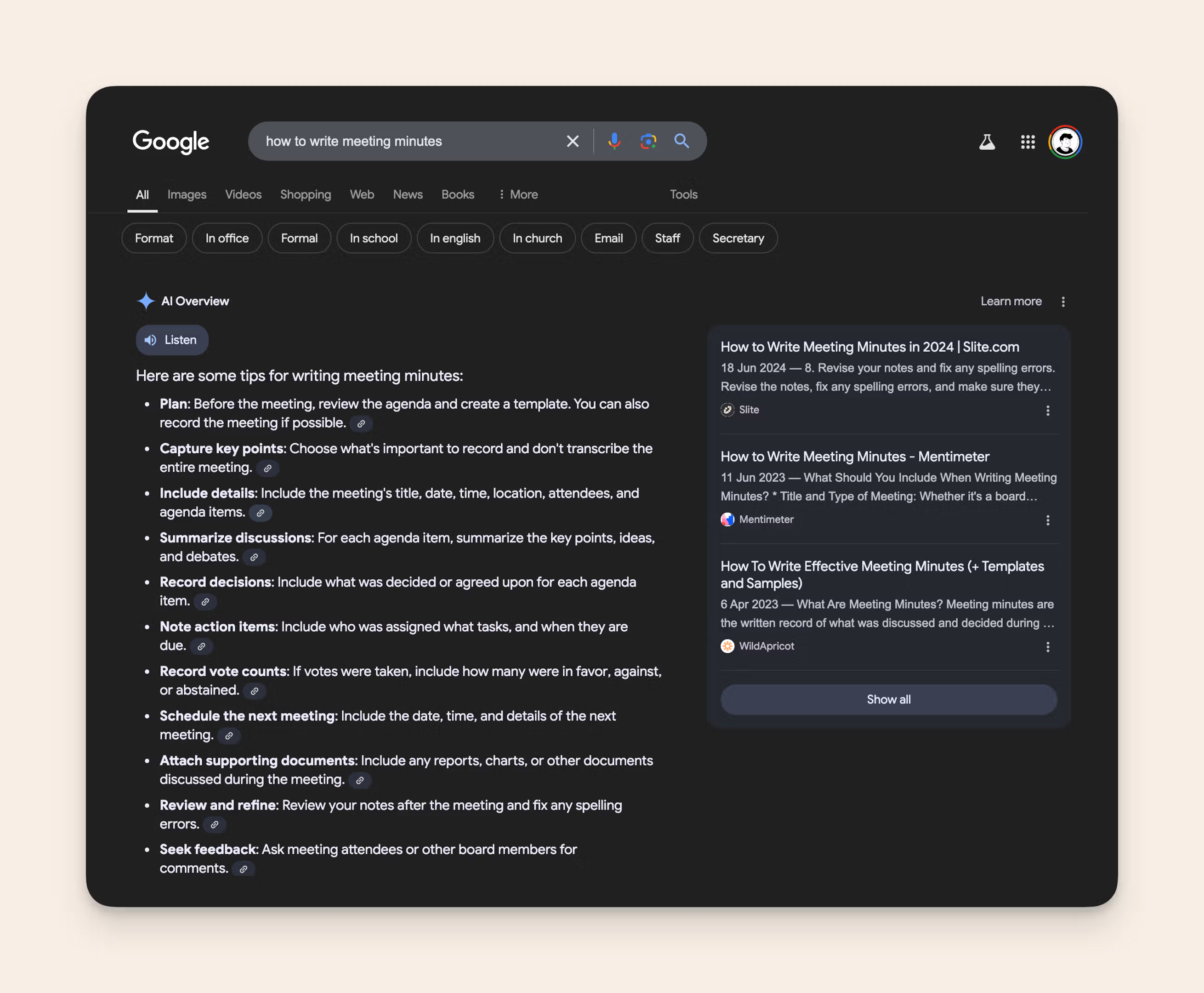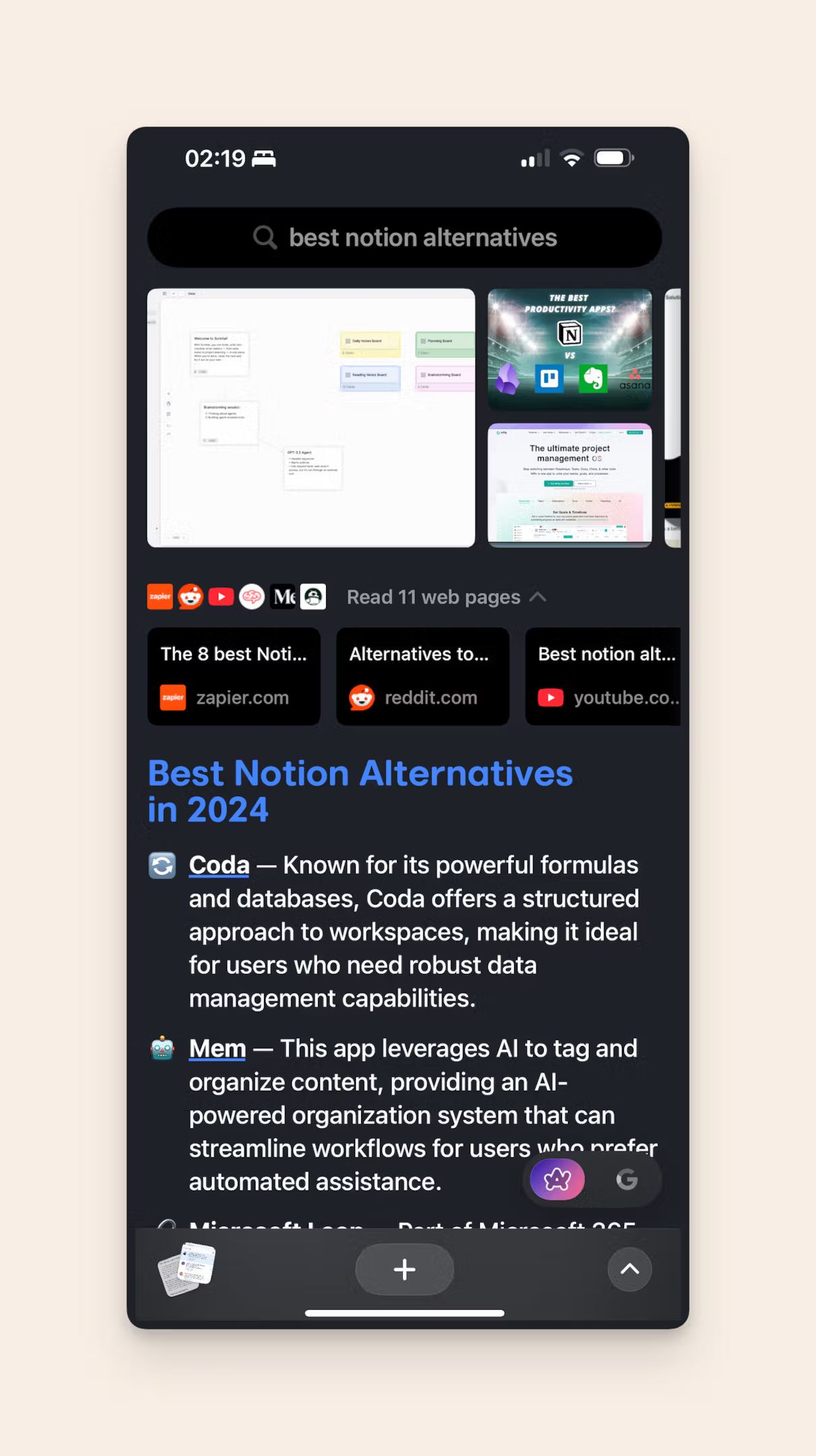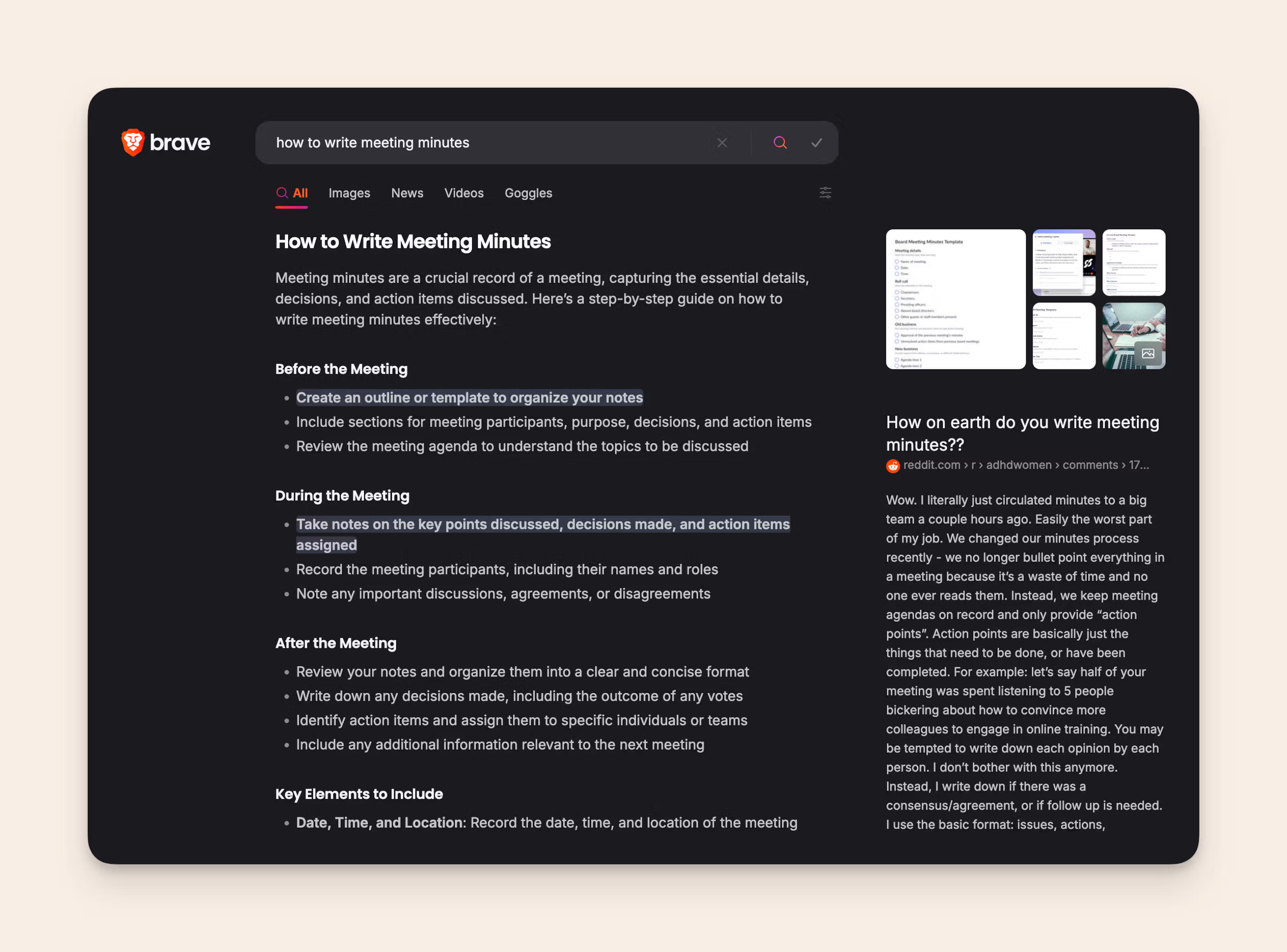What is an AI Search Engine?
An AI search engine uses artificial intelligence to improve search results by analyzing user intent, contextualizing queries, and ranking information based on relevance. Unlike traditional search engines, AI search engines employ machine learning, natural language processing, and data analytics to deliver personalized and precise answers.
These advanced search engines use NLP and generative AI to deliver more accurate and relevant results.
When you search for "best practices for remote team management," the AI understands concepts like virtual collaboration, team engagement, and leadership strategies, even if these exact terms aren't used.
What sets AI search engines apart is their ability to engage in more human-like interactions. They can:
- Answer complex questions directly
- Provide concise summaries of information
- Ask clarifying questions to better understand your needs
- Learn from user interactions to improve results over time
Key Features of the Best AI Search Engines
The best AI search engines excel with advanced features like natural language understanding, which interprets conversational queries without specific keywords. They integrate generative AI to produce summaries and direct answers from various sources. Interactive clarification resolves ambiguity by asking follow-up questions. Hybrid search combines traditional and semantic methods, while continuous learning enhances accuracy through user interactions.
Natural Language Understanding
Comprehends conversational queries like a human, similar to how AI tools such as Perplexity and Arc Search operate, eliminating the need for specific keywords or syntax.
Generative AI Integration
Generates summaries and direct answers from multiple sources, reducing time spent reviewing separate pages.
Interactive Clarification
Asks follow-up questions for ambiguous queries (e.g., clarifying "python" as programming language or snake).
Hybrid Search Capabilities
Combines traditional search with AI capabilities, using both keyword matching and semantic understanding.
Continuous Learning
AI models improve performance through user interactions, enhancing result accuracy and relevance over time.
Top AI Search Engines for Research
Perplexity AI
A conversational AI search engine that provides accurate and relevant search results.
Perplexity AI is probably your best bet for research. Free users can enjoy unlimited quick searches and create a user profile for personalized search results. It’s like having a conversation with a knowledgeable assistant who actually understands what you’re asking. Try asking something like “Explain the impact of AI on healthcare in the last 2 years” - you’ll get a clear, sourced summary instead of just links.

Google’s AI Overviews
Google's AI Overviews is a feature that combines traditional search with AI-generated insights.
Google’s AI Overviews is perfect if you’re already comfortable with Google. It adds AI summaries above your regular search results, giving you quick insights before you dive deeper. Great for getting quick overviews of complex topics.

Arc Search
A mobile AI search engine that provides detailed reports and automates the search journey.
Arc Search is changing the game for mobile research. Instead of jumping between websites, it creates detailed reports from multiple sources, enhancing the search result. Ask something like “compare electric car brands” and it’ll compile a comprehensive comparison automatically.

Brave Search
A privacy-focused AI search engine that provides a secure and private search experience.
Brave Search is your go-to if privacy matters. It offers AI-powered search without tracking your data. The results are solid, and you won't have to worry about your search history being used for ads or tracking.

AI Search Engine Options
The AI search engine landscape is rapidly evolving, offering users a plethora of options to enhance their online research experience. Among the top contenders are Perplexity, Google AI Overviews, Microsoft Bing, Brave Search, and You.com. Each of these AI-powered search engines brings something unique to the table.
Perplexity stands out with its conversational interface, making it feel like you’re chatting with a knowledgeable assistant. Google AI Overviews, on the other hand, integrates seamlessly with traditional search, providing AI-generated summaries that offer quick insights. Microsoft Bing combines the power of AI with a familiar search interface, delivering precise and relevant results. Brave Search prioritizes user privacy, ensuring your search history remains confidential. Lastly, You.com offers a customizable search experience, allowing users to tailor their search results to their preferences.
When choosing an AI search engine, it’s essential to consider factors such as data privacy, search accuracy, and user interface design. Each of these search engines excels in different areas, so understanding your specific needs will help you select the best AI search engine for your research.
User Experience and Interface Design
The user experience and interface design of AI search engines are crucial in determining their effectiveness and ease of use. A well-designed interface should be intuitive, user-friendly, and capable of delivering clear and concise search results.
Perplexity and You.com offer conversational interfaces that allow users to interact with the search engine in a more natural and engaging way. This approach can make the search process feel more like a dialogue, enhancing the overall user experience. On the other hand, Google AI Overviews and Microsoft Bing provide a more traditional search interface, augmented with AI-generated summaries and overviews. This combination offers the familiarity of traditional search with the added benefits of AI insights.
When evaluating AI search engines, consider how the user experience and interface design align with your preferences and workflow. An intuitive design can significantly enhance your search efficiency, making it easier to find the information you need quickly and accurately.
Data Privacy and Security
Data privacy and security are paramount when using AI search engines. Some AI search engines, like Brave Search, prioritize user privacy by offering features such as encrypted search queries and anonymous browsing. This ensures that your search history and personal data remain confidential and secure.
In contrast, search engines like Google AI Overviews and Microsoft Bing may collect user data to enhance their services and provide targeted advertising. While this can improve the relevance of search results, it also raises concerns about data privacy and security.
When choosing an AI search engine, it’s essential to consider the data privacy and security features offered. Ensure that your personal data is protected and be aware of the potential risks, such as the collection of sensitive information and the possibility of bias in search results. By prioritizing privacy and security, you can enjoy a safer and more secure AI search experience.
The Future of Search Engines
Search is undergoing its biggest transformation since Google changed the game in the late '90s. Here's what's actually happening:
Generative AI is reshaping search in real time. Instead of just finding information, search engines are now understanding, synthesizing, and creating responses. This means you get direct answers rather than just links to wade through.
There's a catch though - this shift could fundamentally change how the internet works. When AI engines summarize content directly, websites might receive fewer visits. This could impact everything from advertising models to how content is created and monetized online.
The most likely outcome? A hybrid approach. Traditional search isn't going away, but it's being enhanced by AI capabilities. Think of it like having both a library catalog (traditional search) and a knowledgeable librarian (AI) helping you find exactly what you need.
What this means for you:
- Faster, more accurate research
- Less time sorting through irrelevant results
- More interactive search experiences
- Better understanding of complex topics
Choosing the Right Search Engine for Your Needs
Start by identifying your primary search goals:
- Deep research and academic work → Perplexity AI excels at detailed, sourced responses
- Quick information gathering → Google AI Overviews provides fast, reliable summaries
- Complex mobile research → Arc Search compiles comprehensive reports
- Privacy-conscious searching → Brave Search offers secure, tracking-free results
Other search engines, such as You.com and Perplexity, offer unique AI-driven experiences and layouts. However, they may also have limitations or differences in user interface compared to traditional search platforms.
Key Considerations:
- Interface: Look for intuitive design that matches your workflow
- Accuracy: Check if results are current and well-sourced
- Privacy features: Consider what data is collected and how it’s used
- Integration capabilities: Ensure it works with your existing tools
- Response quality: Test how well it understands complex queries
Maximizing the Potential of AI Search Engines
- Frame queries in natural language - "What are the main factors affecting climate change?" works better than "climate change factors"
- Provide context in your searches for more accurate results
- Use follow-up questions to refine your search
- Combine AI and traditional search for comprehensive research
- Take advantage of built-in features like summarization and source checking
Pro Tips:
- Start broad, then narrow down with more specific queries
- Use the AI's ability to compare and contrast information
- Save particularly useful searches or responses
- Learn each engine's unique features and strengths
- Don't hesitate to rephrase questions for better results
Best AI Search but Only on Your Company Data
The AI search engines we've discussed excel at finding information across the public web, but what happens when you need that same intelligent search power for your company's scattered internal data? Most organizations struggle with information buried across Slack conversations, Google Drive files, Linear tickets, GitHub repositories, and dozens of other business tools.
This is exactly why we built Super - to bring enterprise-grade AI search to your company's private data ecosystem. After successfully creating Slite as a knowledge management platform, we realized the bigger challenge wasn't storing information, but finding it across the dozens of tools modern teams use daily.
What Makes Super Different from Public AI Search
- Cross-Tool Intelligence: While Perplexity searches the web, Super searches across all your business applications simultaneously. Ask "What's blocking Project Alpha?" and get answers from Linear tickets, Slack discussions, and project documentation with complete source attribution.
- Context Awareness: Super understands your team structure, project nomenclature, and organizational hierarchy. It knows that when someone asks about "the Wilson project," they're referring to your internal project codename, not something on the public web.
- Workflow Automation: Beyond search, Super automates complex tasks like RFP responses and status reports by leveraging semantic understanding across your entire tech stack. This goes far beyond what public search engines can offer.
- Source Citation with Confidence: Every answer shows exactly where information came from across your tools, with confidence scores. You can trust and verify AI-generated insights because you see the complete source trail.
- The Results: Our customers save an average of 4 hours per person per week by asking natural language questions like "What caused the API outage last month?" and getting comprehensive answers that pull context from multiple business tools in seconds.
- Universal Access: Available via Chrome extension, Slack bot, web app, API, and even direct integration with Claude through the Model Context Protocol - making enterprise AI search as accessible as public search engines.
If you're impressed by what AI search can do for web research, imagine having that same power working across all your company's data. Book a demo to see how enterprise AI search can transform your team's access to internal information.
Conclusion
Whether you're doing deep research with Perplexity AI or prioritizing privacy with Brave Search, these tools are making information discovery more efficient and intuitive than ever.
But what about searching your company's internal data?
If you're thinking "This is great, but I need this kind of AI search for my company's documents and data," you're not alone. That's where AskX comes in. Ask brings the power of AI search to your organization's private data, enabling your team to find exactly what they need across all your internal documents, just like these advanced search engines do for the public web.
Want to learn how AskX can transform your company's internal search experience? Check it out here.

